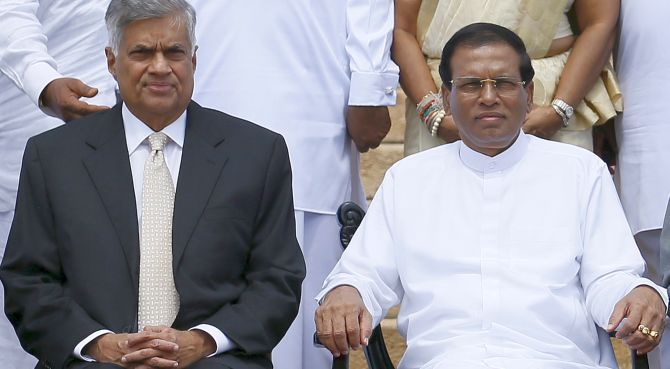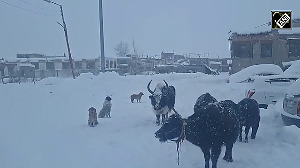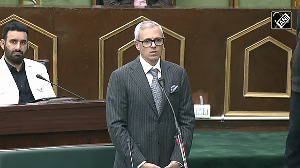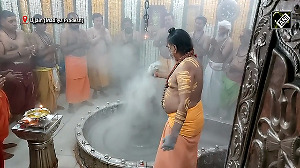'Sirisena will keep both Rajapaksa and Wickremesinghe on tenterhooks till the next general election due in 2020,' says Aditi Phadnis.

IMAGE: Sri Lankan President Maithripala Sirisena, right, with Prime Minister Ranil Wickremesinghe. Photograph: Dinuka Liyanawatte/Reuters
Opposition leader and former Sri Lankan president Mahinda Rajapaksa must be laughing his head off.
Despite all the cases of corruption against him and his family, despite the harassment and the jail terms that members of his family have had to serve, it was he who swept the civic elections in the island last month.
The victory has thrown the ruling dispensation lead by President Maithripala Sirisena and Prime Minister Ranil Wickremesinghe into a blind panic.
So much so that the two are scrapping with each other instead of attacking their common enemy and the result is that the government in Sri Lanka is virtually dysfunctional.
Wickremesinghe reshuffled his council of ministers assuming control of the law and order portfolio on February 26 and within days, another round of religious violence between minority Muslims and Sinhala Buddhists broke out, 'forcing' the president to impose an emergency (it was lifted on Sunday, March 18) emasculating his own prime minister.
The PM was divested of that portfolio altogether by presidential fiat.
There is a background to this pattern of ethnic violence. The first Sinhala-Muslim riot was reported in 1915, largely because of land issues.
Later, as Tamil nationalism began to rise, the Muslims, fearing for their life in eastern Sri Lanka where they share boundaries with Tamils and are in sizeable numbers (30 per cent in Ampara, for instance), they sided with the Sinhala community, going so far as to back S W R D Bandaranaike's Sinhala Only plank.
The 2009 military victory that crushed the Tamil movement -- during Rajapaksa's presidency -- also led to a consolidation of Sinhalese Buddhist nationalist sentiment.
This gave way to the foundation of the Bodu Bala Sena (translated as the Army of Buddhist Power), or BBS, a grouping of monks whose political wing calls itself the Bodu Jana Peramuna.
When you don't have an enemy you sometimes have to invent one.
BBS grew to become the militant arm of political Buddhism. In 2013, it announced its opposition to certain Muslim practices, such as halal certification, and women's dress, such as the niqab and the abaya.
In 2014, Sri Lanka saw a riot between Muslims and Sinhalese Buddhist nationalists at Aluthgama, resulting in three deaths, more than 78 injured, and many others forced to flee their homes.
The incident led to the unprecedented public denunciation of the politics of the Peramuna by diplomats of half a dozen countries.
Although the BBS obtained only 0.18 per cent of the vote in the 2015 elections, Rajapaksa has continued to nurture the organisation from his perch in the Opposition.
Muslims are only about 10 per cent of the population of Sri Lanka while 75 per cent is Sinhalese Buddhist.
However, Muslims have historically dominated business and commerce.
In its political rhetoric, the BBS continues to criticises Muslim business practices, speaks of the community's 'greed' and 'avarice', and ignores more than a thousand years of peaceful coexistence.
It also noted that the Sri Lanka Muslim Congress' M H M Ashraff used to begin all political meetings with a cry of 'Allahu Akbar'. So a base for the politics of hate had been laid.
Security agencies in Sri Lanka say that in riposte, the rise of Islamic fundamentalism is Sri Lanka's biggest threat, situated as it is next door to the Maldives.
Sirisena would like to expose the Rajapaksa linkage to the militant Sinhalese Buddhist nationalist group. But he would prefer to stay on the right side of the Buddhist clergy and the majority of the population.
Wickremesinghe has posted magnificent electoral victories in the Tamil dominated north and east. For him, these areas represent the gap between victory and electoral defeat.
To reassure his constituency he has announced the appointment of members to the Office of Missing Persons, set up as part of the reconciliation process between the Sinhala Buddhist majority and the Tamil minority after the three decade war.
He has challengers within his party. The principal among them is Sajith Premadasa, son of Sri Lanka's former president.
Deputy foreign minister Wasantha Senanayake from the Senanayake clan (descendant of Dudley Senanayake, a former prime minister) has been quoted as saying that as Wickremesinghe doesn't listen to the younger members of the party 'we will have to clean his ears'.
The Rajapaksa group is jubilant -- President Sirisena's action of imposition of emergency has vindicated its claim that under Wickremesinghe, the economic and social future of Sri Lanka is in jeopardy.
To buttress its claim, the group cites the fact that Sri Lanka's former finance minister Ravi Karunanayake had to step down following charges of bribery and corruption and Wickremesinghe was summoned to that enquiry.
However, a new entente between Sirisena and Rajapaksa is unlikely because of a deep trust deficit.
What is more likely is that Sirisena will keep both Rajapaksa and Wickremesinghe guessing and on tenterhooks till the next general elections due in 2020.
Meanwhile, the bureaucracy, sensing confusion in the chain of command is standing still and working to rule.
Things are never easy in Sri Lanka.












 © 2025
© 2025